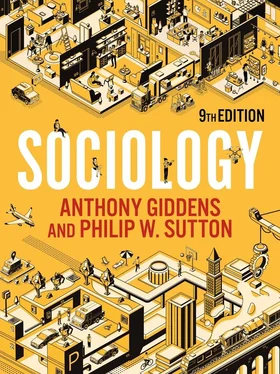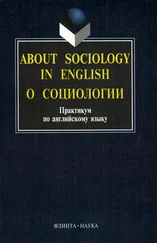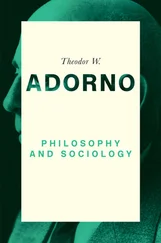Chapter 20, ‘Politics, Government and Social Movements’ – social movement organizations and social media, Castells on networked social movements
Chapter 21, ‘Nations, War and Terrorism’ – digital technology and terrorism
Chapter 22, ‘Crime and Deviance’ – AI and predictive policing, cybercrimes and cybersecurity
Our fourth theme is identity, a concept that connects the individual’s experience to their wider social context. To talk about identity means considering the questions ‘who am I?’, ‘who are you?’ and ‘does my view of you match your own view of your identity?’ Does our personal identity change over time, and, if so, how? For sociologists, our starting point is that individual or ‘personal’ identities are not biologically given but socially created in social interactions. The mundane, but thoroughly revolutionary conclusion is that, in spite of everything we may feel and no matter how strongly we feel it, our identity is, in highly significant ways, shaped by other people. All identities are social identities.
There are many sources from which our identities are constructed: nationality, ethnicity, social class, gender, occupation, political affiliation, religion, sexuality, musical taste and lots more. We may find that, at different times, one of these seems to define our real, ‘authentic’ identity more than all others. Yet, if that perception shifts, has our identity then changed? Sociological studies show that questions of identity have become more significant today than in the past, and the book contains many discussions of the subject.
Identity in the ninth edition
Understanding the increasing significance of personal and social identity construction has become an important part of sociological analysis. As globalization and the digital revolution continue to progress and deepen, their impact on socialization processes and identities also increases. The main discussions of identity are as follows:
Chapter 3, ‘Theories and Perspectives’ – the social self and identity, theories of identity formation
Chapter 4, ‘Globalization and Social Change’ – globalization’s impact on national identity, glocalization, modernity and reflexive individualism
Chapter 5, ‘The Environment’ – risk and identity, theories of the ecological self
Chapter 7, ‘Gender and Sexuality’ – theories of gender identity, sexual identities, gender fluidity and transgender identities, masculinity/femininity and identity
Chapter 8, ‘Race, Ethnicity and Migration’ – ethnicity and identity, black identity and ‘new’ ethnicities, intersectionality and ethnic identities, multiculturalism and multiple sources of identification, diaspora and identity
Chapter 9, ‘Stratification and Social Class’ – intersecting inequalities and forms of identity, class-based identity, consumer lifestyles and identities, disidentifying with the working class
Chapter 10, ‘Health, Illness and Disability’ – eating disorders and personal identity, illness and the changing perception of self-identity, disability and identities
Chapter 12, ‘Social Interaction and Daily Life’ – sociological theories of identity, embodiment and personal identity, theories of gender identity, identities in online environments
Chapter 14, ‘The Life Course’ – theories of self-formation and socialization, theories of gendered identities, social roles and identities, ageing and changing identities
Chapter 16, ‘Education’ – schools and sexual identities, cultural reproduction and gender identity
Chapter 17, ‘Work and Employment’ – work and self-identity, consumerism and identity construction, impact of unemployment on identity
Chapter 18, ‘Religion’ – identity kits and neotribes, lived religion and personal identity
Chapter 19, ‘The Media’ – music and identity construction, disabled identities in the mass media
Chapter 20, ‘Politics, Government and Social Movements’ – ideology and identity formation, national and transnational identification, social movements and identity change, identity in the new social movements
Chapter 21, ‘Nations, War and Terrorism’ – populism and national identity, nationalism as a source of fundamental identity, the colonial legacy and national identity in the Global South, globalization as a challenge to national identities
Chapter 22, ‘Crime and Deviance’ – the labelling perspective and self-identity, crime and the master status, identity theft
The main elements of our approach
There are three recurring features in our broad approach to sociology in the book. First, we look to connect small-scale, micro-level social encounters with the large-scale, macro level of social institutions and societies. Individual interactions can have an impact on the larger world of social institutions, but the latter also influence our daily lives in very profound ways. This is a two-way interchange and lies at the heart of many social processes. It is our view that comprehensive sociological analysis requires situations and events to be understood at both the micro and the macro level.
Second, the book adopts a comparative-historical standpoint. In our global age, sociology must investigate the relationships between a range of societies and the varied ways in which they influence one another. A wide variety of source material is introduced that is drawn from many societies around the world. In particular, most chapters cover societies in both the Global South and the Global North, which makes for a more comprehensive understanding. In our view, comparative, historical sociology is essential if we are to understand today’s globalizing social world.
Third, we continually seek to connect the social with the personal. In this sense we take a lead from the American sociologist C. Wright Mills, who said that sociology connects the study of personal troubles, such as losing a job or getting divorced, with wider social issues, such as economic restructuring and shifting gender relations. The task of sociologists is to connect people’s personal experience to patterns of social change in order to arrive at a better understanding.
Studying sociology can be a liberating experience that opens up our imagination, bringing new ideas and perspectives to bear, creating an awareness of areas of social life and cultures that are very different from our own. Sociology can also force us to see familiar aspects of life in new ways that challenge our firmly held opinions. This is the starting point for developing a sociological way of thinking, or what sociologists call a sociological imagination.
The ninth edition adopts interactive features designed to engage readers actively with the text. Classic studies boxes introduce some of sociology’s most influential pieces of work, but be aware that ‘classic’ is not just another word for ‘old’. Sociology makes progress by constantly testing ideas, theories and methods in the thousands of research projects, journal articles and books that constitute academic sociology. Of course, the majority of research studies never achieve the status of ‘classics’, but this does not mean they have no value. However, sometimes significant new discoveries are made, a novel research method is devised, or a new theory exerts a major influence on the direction of the discipline. In these cases they may be recognized by professional sociologists as ‘classics’. Hence, a ‘classic’ can be any age, and our selections in the book reflect this. Not everyone will agree with all of our choices, but they are not purely random, personal choices. We have tested them on numerous anonymous reviewers, lecturers and readers, which reassures us that they are widely acknowledged as significant.
Читать дальше












